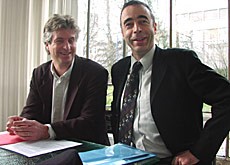Swiss cinema fights for more exposure

As Switzerland’s annual film festival is in full swing in the town of Solothurn, a new organisation is attempting to promote Swiss cinema abroad.
Swiss Films is a three-year pilot project that aims to revive the international reputation of the country’s films and boost their distribution.
The organisation plans to make a start at the Solothurn festival, widely regarded as a showcase for Swiss feature films and documentaries.
“The aim of our presence in Solothurn is to serve as an interface between cinema professionals and people attending the festival, particularly those coming from abroad,” says Micha Schiwow, director of Swiss Films.
The festival enables film producers, distributors and other behind-the-scenes players a chance to get together and exchange ideas during discussion groups, award ceremonies and cocktail parties.
Golden age
Switzerland’s international reputation for producing high quality films has waned since the 1970s and 1980s when a number of Swiss productions gained international critical acclaim and sold well in foreign markets.
Switzerland’s cinematic heyday culminated in an academy award for “Journey of Hope” by Xavier Koller, who won an Oscar for Best Foreign Film in 1991.
But today Swiss productions are notably absent from the international scene, with few names making it abroad.
“If you ask someone to name some famous Swiss filmmakers, the answer will be Jean-Luc Godard and Alain Tanner,” Schiwow told swissinfo. “But nobody knows anyone from the younger generation.”
Lack of money
The difference between now and then is a lack of funding, according to Peter Tremp of the Solothurn film festival.
“It is very difficult to get money to finance a film today. Even Tanner [an established director] has to go through all the stages of asking for money like a 20-year-old novice,” Tremp told swissinfo.
For his part, Schiwow is also frustrated that Switzerland’s national languages are not being used more to tap into the foreign market.
“We have the same common languages as Austria, Germany, Italy and France so it is possible to export our films,” Schiwow says.
Aside from seeking greater distribution abroad – particularly in international festivals – Swiss Films also aims to increase the number of homegrown films being screened in Switzerland’s cinemas.
“Right now, only around three or four per cent of films shown in the cinema are Swiss. We would like to see that rise up to seven or ten per cent.”
Polish flavour
One way to boost cinematic output and lack of finance is to cooperate with filmmakers from other countries. Solothurn’s festival programme is featuring 15 Polish films this year, and a number of directors from Poland are attending.
“We want to cooperate with Poland to produce films. A lot of countries in Europe are too small to raise all the money required to produce a big film, so we hope that we can work on this together,” Tremp told swissinfo.
He says many young Swiss filmmakers have become familiar with the Polish film industry by attending seminars by some of Poland’s most famous filmmakers such as Krzysztof Zanussi and Krzysztof Kieslowski.
As well as industry insiders, around 40,000 people are expected to attend some of Solothurn’s 250 screenings – many of them short productions.
As for feature length films, the Swiss box office hit “Achtung, Fertig, Charlie!” – the biggest commercial success since “The Swissmakers” in 1978 – won a special casting prize.
The comedy has been seen by more than a half million people since its release in September.
The Swiss film “Strähl”, about a Zurich police officer who becomes embroiled in the drug scene that he is fighting against, is one of the films that will premiere at the festival.
Alongside feature films, a number of documentaries are also by getting their first screening at the festival. One of them, “Krokus – as long as we live”, traces the story of a renowned Swiss rock band.
swissinfo, Karin Kamp
Swiss Films aims to promote Switzerland’s films and documentaries both abroad and at home.
It has been set up jointly by the Swiss Arts Council, the Swiss Film Centre and the Swiss Short Film Agency.
Until now, the promotion of Swiss films was undertaken by the three offices separately.
“Mein Name ist Bach” (My Name is Bach) by director Dominique de Rivaz has won this year’s prize for best Swiss feature film.
Jean-Stéphane Bron’s “Mais im Bundeshuus – Le génie Helvétique”, a documentary about the work of parliamentarians, also won a top award.
The box-office hit, “Achtung, fertig, Charlie!” received a special award for best casting.

In compliance with the JTI standards
More: SWI swissinfo.ch certified by the Journalism Trust Initiative










You can find an overview of ongoing debates with our journalists here . Please join us!
If you want to start a conversation about a topic raised in this article or want to report factual errors, email us at english@swissinfo.ch.